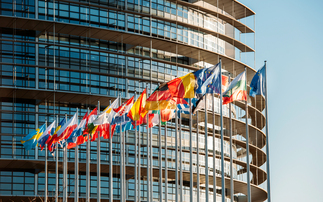Wide-ranging report comes amid concerns the UK is not doing enough to progress the global Sustainable Development Goals
The UK's first national review of progress towards meeting the UN Sustainable Development Goals (SDGs) has been launched by International Development Secretary Rory Stewart, who heralded the exercise as "an opportunity to reflect" on how the country conducts itself both at home and abroad.
Released last week, the wide-ranging 234-page report aims to highlight the breadth of work being carried out by the government, civil society, businesses, and the public across the UK in support of the 17 SDGs, both domestically and internationally. It also outlines the significant remaining challenges that will need to be overcome in order to achieve the targets by 2030.
Adopted by all 193 members of the UN in 2015, the 17 SDGs tackle a wide range of environmental and economic issues facing both developed and developing countries. The new report includes a chapter on each of the targets covering issues such as poverty, inequality, climate change, biodiversity, work, and access to health and education.
On SDG 13, which focuses on climate action, the report sets out efforts being made across the UK to strengthen climate resilience and adaptation, boost green finance and investment, and improve education and awareness of climate change across England, Wales, Scotland, and Northern Ireland.
"Failure to act on climate change will have serious consequences both in the UK and internationally," the report states, conceding that further action is needed right across all other sectors of the UK economy. "UK achievements to date have been substantially driven by significant decarbonisation of the power and waste sectors and this success now needs to be replicated across the economy, particularly in the transport, business and industry sectors which account for almost half of current emissions."
It also places a strong emphasis on leveraging private finance towards delivering both the SDGs and national decarbonisation goals. "Clean growth also requires breakthroughs in clean technologies," it states. "Public sector funding and innovations in universities are crucial to this, but such breakthroughs also need the creativity and energy of the private sector."
The UK government has previously faced fierce criticism over its approach to the SDG agenda, with MPs on the Environmental Audit Committee in 2017 claiming ministers had "no strategy or vision" for delivering the targets, leaving a "doughnut-shaped hole" where state-backed sustainable development efforts should be. The EAC had called for an independent statutory body modelled on the Committee on Climate Change to oversee and assess the UK's progress towards the SDGs.
Businesses have also been pushing for more action on sustainable development, many of which are increasingly building their own long-term strategies around the 17 Global Goals. In January 2017 more than 80 companies - including top brands such as Diageo, HSBC, IKEA and Unilever - urged the Prime Minister to formulate a clear strategy for meeting the SDGs, which they said were "essential for long-term prosperity" and the wellbeing of future generations.
An influential 2017 report from the international Business and Sustainable Development Commission suggested delivering the SDGs would unlock massive economic and commercial benefits, driving trillions of dollars in investment and cost saving, while slashing economic and environmental risks.
The report estimated that across just four economic systems - food and agriculture, cities, energy and materials, and health and well-being - meeting the SDGs would drive $12tr in business savings and revenue by 2030. "The total economic prize from implementing the Global Goals could be two to three times bigger, assuming that the benefits are captured across the whole economy and accompanied by much higher labour and resource productivity," the report stated. "That's a fair assumption. Consider that achieving the single goal of gender equity could contribute up to $28tr to global GDP by 2025, according to one estimate."
Fresh from his unsuccessful tilt to become the next Prime Minister, Stewart officially launched the government's SDG review last Wednesday at a primary school in North London. Its findings are due to be presented to the UN next month. All UN members are expected review their national progress towards meeting the 17 Goals by 2030 at least once.
The report states that the government plans to "review and further strengthen the existing means and mechanisms" to oversee domestic delivery of the SDGs, building on the Single Departmental Plan process across Whitehall.
"This review will take place as a matter of priority and will examine both official and ministerial level structure," it states.
With a new Prime Minister and major cabinet reshuffle looming it remains unclear if Stewart will remain in post for much longer, especially given his fierce criticism of some of his rivals in the leadership race - chief amongst them frontrunner Boris Johnson. However, since taking up the reins as International Development Secretary in May he has made a big show of the UK's commitment to tackling what he has called the "climate cataclysm", including pledging to double the amount of UK foreign aid spent on tackling the problem.
Launching the SDG review, Stewart said the report marked an "opportunity for us to reflect" on how the UK conducts itself both at home and abroad. "And learn through doing it and share with countries, from Malawi right the way through to Indonesia, what we've learnt in how to deal with climate, how to deal with water quality and how to deal with the real challenges that face not just us but every country on earth," he added.
However, as with last week's adoption of a new world-leading net zero emission target, many green businesses and campaigners will be hoping the latest stock-taking review triggers not just outreach to help other countries with their SDG obligations, but also a renewed domestic policy drive to ensure the UK actually meets the its many sustainability goals. From greenhouse gas emissions and biodiversity protection to gender equality and poverty eradication the UK is still a long way from delivering on the huge promise of the SDGs.









